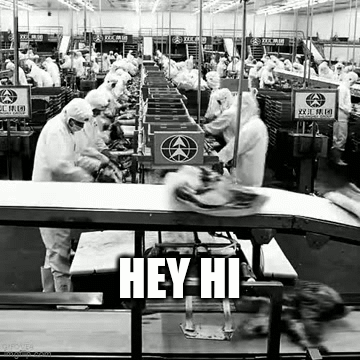

Don't listen to buzzwords; they're misused a lot and sometimes just a passing fad
"The WGA strike," one reader told us, "is about malicious and exploitative abuse of "AI" [as in CG or computer-generated stuff]" and "industry profits have ballooned from $5 billion in 2000 to $28-$30 billion from 2017-2021" [1] while people who did all the actual work did not see their compensation rising sixfold. So where did that surplus go? Another new article [2] states: "Actors, writers, and multimedia artists are all having their jobs threatened because of low-return, high-yield AI and generative products that do not have the ability to replicate human work and should not be utilized in order to do so."
"They sort of starve them into a position of weakness and (they hope) surrender."They've basically rebranded computer-generated (CG) as "Hey Hi", but buzzwords and semantics aside, this is an attack on workers whose yield or output (of labour) was always better than some means of automation. In other words, studios are willing to compromise on quality for purely economic reasons, prioritising shallow things over creativity and culture.
"Even if the 160,000-member SAG-AFTRA joins the WGA on the picket lines, the studios hope to get the actors back to the negotiating table in a few weeks," says another new article [3] (all those are in Daily Links already).
"The fight that these professionals are fighting closely resembles or aligns with the fight of programmers and system builders."They sort of starve them into a position of weakness and (they hope) surrender.
The fight that these professionals are fighting closely resembles or aligns with the fight of programmers and system builders. The "industry" has been working to crush and devalue them -- to the detriment of everyone who uses software or some kind of computer, i.e. almost everyone in the world. This is not a case of "neo-Luddites" against innovation, progress, and technological advancement. Just like at the EPO, what we have is actual professionals warning against illegal financialisation of everything. ⬆
Related/contextual items from the news:
“Though we negotiated intent on making a fair deal — and though your strike vote gave us the leverage to make some gains — the studios’ responses to our proposals have been wholly insufficient, given the existential crisis writers are facing,” the negotiating committee wrote to membership in a letter. “The companies’ behavior has created a gig economy inside a union workforce, and their immovable stance in this negotiation has betrayed a commitment to further devaluing the profession of writing.”
[...]
Meanwhile, according to the WGA’s calculations, industry profits have ballooned from $5 billion in 2000 to $28-$30 billion from 2017-2021. Spending on original streaming content grew from $5 billion in 2019 to $19 billion in 2023 — the lion’s share of it by Netflix, which reported $6 billion in operating profits in 2021 and $5.6 billion in 2022.
If anything will help illustrate the absolute necessity of SAG-AFTRA striking, it’s these proposed “groundbreaking” AI concessions that the AMPTP allegedly offered during negotiations. It was addressed in remarks by one of the SAG-AFTRA leaders, Duncan Crabtree-Ireland, who explained: “They proposed that our background performers should be able to be scanned, get one day’s pay, and their company should own that scan, their image, their likeness and should be able to use it for the rest of eternity, in any project they want with no consent and with no compensation.”
[...]
This sort of investment in AI, regardless of how it abuses working class people or devalues artists, is spreading across multiple industries. Actors, writers, and multimedia artists are all having their jobs threatened because of low-return, high-yield AI and generative products that do not have the ability to replicate human work and should not be utilized in order to do so. As SAG-AFTRA officially joins the WGA and heads into a historic strike, both unions do so with the future of the industry in their collective hands.
The severe method comes out of the guild’s successful battle with the agencies in 2021 over dismantling the lucrative practice of packaging. The WGA picked off one agency after another until final holdout WME backed down, a tactic seen as a warning sign by many in the studio and streamer C-suites.
[...]
On a parallel track and reinforcing the AMPTP’s divide-and-conquer approach, negotiations with the Director’s Guild in late May proved a success, with ratification coming last month. Even if the 160,000-member SAG-AFTRA joins the WGA on the picket lines, the studios hope to get the actors back to the negotiating table in a few weeks.